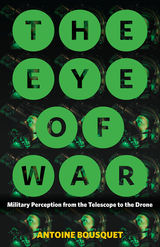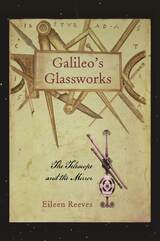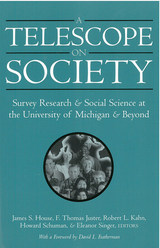
How perceptual technologies have shaped the history of war from the Renaissance to the present
From ubiquitous surveillance to drone strikes that put “warheads onto foreheads,” we live in a world of globalized, individualized targeting. The perils are great. In The Eye of War, Antoine Bousquet provides both a sweeping historical overview of military perception technologies and a disquieting lens on a world that is, increasingly, one in which anything or anyone that can be perceived can be destroyed—in which to see is to destroy.
Arguing that modern-day global targeting is dissolving the conventionally bounded spaces of armed conflict, Bousquet shows that over several centuries, a logistical order of militarized perception has come into ascendancy, bringing perception and annihilation into ever-closer alignment. The efforts deployed to evade this deadly visibility have correspondingly intensified, yielding practices of radical concealment that presage a wholesale disappearance of the customary space of the battlefield. Beginning with the Renaissance’s fateful discovery of linear perspective, The Eye of War discloses the entanglement of the sciences and techniques of perception, representation, and localization in the modern era amid the perpetual quest for military superiority. In a survey that ranges from the telescope, aerial photograph, and gridded map to radar, digital imaging, and the geographic information system, Bousquet shows how successive technological systems have profoundly shaped the history of warfare and the experience of soldiering.
A work of grand historical sweep and remarkable analytical power, The Eye of War explores the implications of militarized perception for the character of war in the twenty-first century and the place of human subjects within its increasingly technical armature.

The Dutch telescope and the Italian scientist Galileo have long enjoyed a durable connection in the popular mind--so much so that it seems this simple glass instrument transformed a rather modest middle-aged scholar into the bold icon of the Copernican Revolution. And yet the extraordinary speed with which the telescope changed the course of Galileo's life and early modern astronomy obscures the astronomer's own curiously delayed encounter with the instrument. This book considers the lapse between the telescope's creation in The Hague in 1608 and Galileo's alleged acquaintance with such news ten months later. In an inquiry into scientific and cultural history, Eileen Reeves explores two fundamental questions of intellectual accountability: what did Galileo know of the invention of the telescope, and when did he know it?
The record suggests that Galileo, like several of his peers, initially misunderstood the basic design of the telescope. In seeking to explain the gap between the telescope's emergence and the alleged date of the astronomer's acquaintance with it, Reeves explores how and why information about the telescope was transmitted, suppressed, or misconstrued in the process. Her revised version of events, rejecting the usual explanations of silence and idleness, is a revealing account of the role that misprision, error, and preconception play in the advancement of science.
Along the way, Reeves offers a revised chronology of Galileo's life in a critical period and, more generally, shows how documents typically outside the scope of early modern natural philosophy--medieval romances, travel literature, and idle speculations--relate to two crucial events in the history of science.

The chapters of this volume illustrate the impact that developments in survey research have had and continue to have on a broad range of social science disciplines and interdisciplinary areas ranging from political behavior and electoral systems to macroeconomics and individual income dynamics, mental and physical health, human development and aging, and racial/ethnic diversity and relationships.
The volume will speak to a wide audience of social science and survey research professionals and students interested in learning more about the broad history of survey-based social science and its contributions to understanding ourselves as social beings. It also seeks to convey how crucial institutional and public support are to the development of social science and survey research, as they have been to development in the natural, biomedical, and life sciences.
The five editors of this book are longtime research professors and colleagues in the Survey Research Center of the Institute for Social Research at the University of Michigan. James S. House is also Professor in the Department of Sociology; F. Thomas Juster is Professor Emeritus in the Department of Economics; Robert L. Kahn is Professor Emeritus in the Department of Psychology and Department of Health Management and Policy; and Howard Schuman is Professor Emeritus in the Department of Sociology; Eleanor Singer is Research Professor in the Survey Research Center, all at the University of Michigan. Professors House (1991-2001), Kahn (1970-76), and Schuman (1982-90) have each served as Director of the Survey Research Center; Professor Juster served (1976-86) as Director of the Institute for Social Research; and Professor Singer served (1999-2002) as Associate Director of the Survey Research Center.
READERS
Browse our collection.
PUBLISHERS
See BiblioVault's publisher services.
STUDENT SERVICES
Files for college accessibility offices.
UChicago Accessibility Resources
home | accessibility | search | about | contact us
BiblioVault ® 2001 - 2024
The University of Chicago Press









